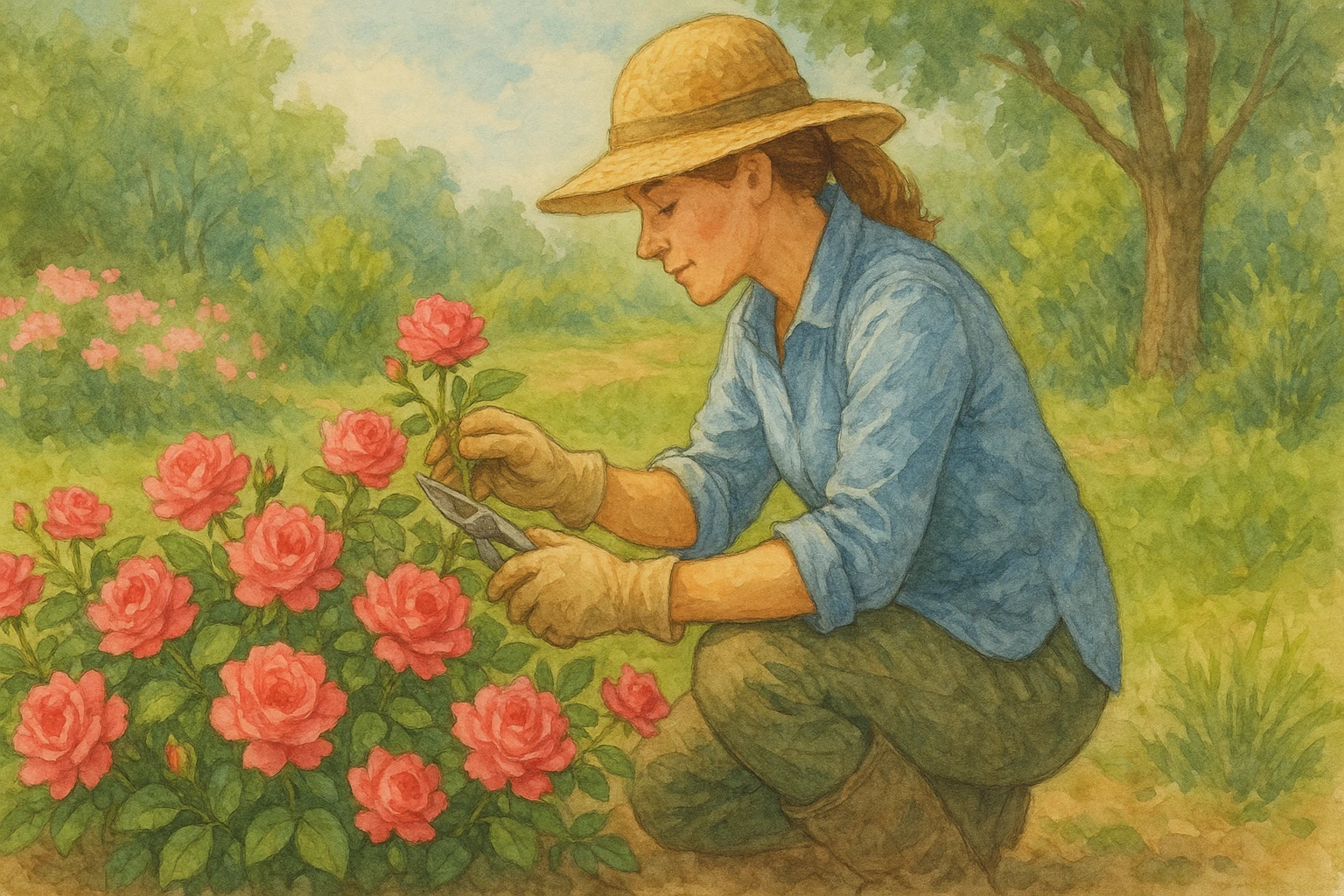Planting Drift Roses in Your Garden: Where to Start and What to Remember
.If your garden needs a burst of vibrant color with none of the usual rose drama, Drift roses are the answer. These low-maintenance, ground-hugging bloomers combine beauty and toughness in a way that few other plants manage. Compact yet prolific, they’re not only easy to plant but incredibly forgiving—making them ideal for beginners and experienced gardeners alike.

What Are Drift Roses?
Drift roses are a modern hybrid: a marriage between groundcover roses (known for their durability and spreading habit) and miniature roses (appreciated for their compact form and manageable size). The result is a plant that grows low and wide, blooms continuously, and resists the issues that plague other rose types.
These roses typically reach just 1.5 to 2 feet in height and spread up to 3 feet in width, making them perfect for:
Sloped areas or erosion-prone hillsides
Edging along paths or borders
Colorful filler between larger shrubs
Containers for patios, balconies, and small spaces
The Benefits That Set Them Apart
Here’s why Drift roses stand out in today’s garden scene:
Feature | Why It Matters |
Disease Resistance | Say goodbye to black spot, powdery mildew, and the constant need for fungicides. |
Long Bloom Season | Expect bright, bold blooms from spring to the first frost—nonstop color. |
Hardy Performance | Tolerates a wide range of climates, including high humidity and drought conditions. |
Low Maintenance | Minimal pruning, no deadheading required, and still looks great. |
Pollinator Friendly | Attracts bees and beneficial insects with open, accessible flowers. |
These attributes make Drift roses particularly appealing for organic gardeners and those looking to reduce chemical inputs and labor without compromising aesthetics.
Color Options That Work With Any Design
Drift roses aren’t just tough—they’re beautiful. Available in shades like coral, red, pink, peach, white, and even apricot, they fit seamlessly into nearly any color scheme. Whether you’re aiming for a monochromatic look or a vibrant mix, there’s a Drift rose for your palette.
Red Drift: Adds drama and depth to traditional landscapes.
Coral Drift: A favorite for Mediterranean or tropical-inspired gardens.
Peach Drift: Works beautifully in pastel cottage gardens.
White Drift: A classic choice for serene, elegant spaces.
Plant them en masse for a bold statement, or mix them with perennials like salvia, lavender, or ornamental grasses for texture and seasonal interest.
Ideal for Small Spaces and Big Designs Alike
Because of their size and habit, Drift roses are especially useful for:
Urban or balcony gardens where space is limited.
Front-of-border plantings that need to stay low and tidy.
Filling in gaps between perennials or evergreens.
Designing pollinator-friendly zones without adding mess.
They require no trellising or staking, and their natural shape is tidy and appealing even without frequent grooming. This “plant it and enjoy it” approach is what draws so many modern gardeners to the Drift rose trend.
Planting Drift Roses — From Site Selection to Aftercare
Now that you’re convinced Drift roses deserve a starring role in your garden, let’s get your hands a little dirty—in the best way.
Step 1: Pick the Right Spot
Drift roses thrive with the right start. And that begins with location.
Sunlight Is Non-Negotiable
Drift roses require at least 6 hours of direct sunlight daily. More sun equals more blooms. Shady areas won’t just reduce flowering—they can also increase the risk of disease due to trapped moisture.
Encourage Airflow
Choose an open space where air can circulate freely. This keeps the foliage dry and helps prevent fungal issues. Avoid overcrowded corners, especially if you're combining roses with other dense plants.
Step 2: Prepare the Soil
Great gardens begin below the surface. Healthy soil is the foundation for any thriving plant.
Drainage is Critical
Roses hate “wet feet.” Ensure the soil drains well—especially after rainfall. If your soil is clay-heavy or compacted, amend it with organic compost, aged manure, or perlite to improve structure.
pH and Nutrients
Drift roses tolerate a pH range from slightly acidic to slightly alkaline (6.0–7.5). If unsure, perform a simple soil test. Add slow-release organic fertilizer or a balanced rose blend to enrich the bed before planting.
Step 3: Dig and Plant Properly
Getting the hole right may sound basic, but it can make a big difference in root health and establishment.
Planting Step | Why It Matters |
Dig Wide, Not Deep | Make the hole about twice the width of the root ball and just as deep. |
Loosen the Bottom | Helps roots spread downward and anchor quickly. |
Plant Slightly High | Position the crown a bit above soil level to allow settling and prevent rot. |
Backfill Gently | Replace soil, firming it gently to remove air pockets without compacting roots. |
Add Mulch | A 2–3 inch layer conserves moisture and suppresses weeds—just keep it off the stem. |
Pro Tip: When placing multiple Drift roses, space them about 2–3 feet apart to allow airflow and mature growth.
Step 4: Watering and Ongoing Care
Drift roses aren’t needy, but a little early attention goes a long way.
Water Deeply—Then Ease Off
Initial Watering: Soak the root zone well immediately after planting.
First Few Weeks: Water 2–3 times a week, depending on weather. Consistent moisture helps establish roots.
After Establishment: Drift roses are drought-tolerant, but benefit from deep watering every 7–10 days during dry spells.
Feed with Care
Use a rose-specific fertilizer once new growth appears. A light feeding every 6–8 weeks through the growing season is usually sufficient. Stop fertilizing around 6–8 weeks before your first expected frost.
Minimal Pruning Required
In early spring or after a growth flush, remove dead wood and shape the plant slightly. No need for intense pruning—Drift roses keep their form naturally.

Common Mistakes to Avoid
Mistake | Fix It Like This |
Planting in shade | Move to a sunnier spot (or prune nearby shrubs blocking light). |
Overwatering | Let the top inch of soil dry out between waterings to prevent root rot. |
Heavy mulching against stems | Pull mulch back an inch or two from the base to avoid crown rot. |
Skipping spring pruning entirely | Remove weak or damaged branches to stimulate healthy new growth. |
Meet Your Digital Garden Assistant: AI Plant Finder
Even the most passionate gardener can use a little help—and in the digital age, support often comes from your smartphone. Whether you’re nurturing your very first Drift rose or managing a well-established landscape, integrating smart tools like the AI Plant Finder app can dramatically simplify your gardening routine.
Key Features and Benefits:
Feature | Function |
Plant Identification | Take a photo of any plant (including roses or companion flowers) to instantly identify it and learn care details. |
Disease Diagnosis | Unsure why your Drift rose leaves are yellowing or spotted? Snap a photo and the app suggests causes and treatments. |
Expert Tips | Get step-by-step care guidance for pruning, watering, soil care, and seasonal maintenance. |
Extensive Database | Access detailed care data for over 300,000 plants, including native, exotic, and hybrid varieties. |
AI Botanist Chat | Ask tailored questions and get real-time advice for your garden setup, zone, or specific rose variety. |
My Garden Tool | Digitally catalog all your plants, set custom reminders, and monitor care progress. |
Water Calculator | Enter your plant type, pot material, local weather, and humidity to receive a precise watering plan. |
Light Meter | Use your camera to measure the light level in different spots—ensuring your Drift roses are soaking up enough sun. |
How AI Fits into Real-Life Gardening
Let’s say your Drift roses are looking droopy. Instead of guessing, you snap a quick picture using the Diagnosis by Photofeature. The app identifies early signs of overwatering and recommends reducing irrigation frequency, plus gives tips on improving drainage.
Or perhaps you're planting companion herbs like lavender or sage nearby. The Plant Identification by Photo tool confirms species and offers compatibility insights. Want to avoid overlapping watering needs? The Water Calculator tailors guidance to each plant, helping you create a truly low-maintenance ecosystem.
You can even schedule:
Seasonal fertilizing alerts
Weekly pruning checks
Light-level evaluations in spring and fall
With these tools, AI doesn’t replace your instincts—it enhances them.
The Drift Rose Gardening Experience: What to Remember
You don’t need to be a horticulturist to grow show-stopping roses. Here’s a recap of what makes Drift roses—and your gardening experience—stand out:
What to Remember |
Sun is everything. 6+ hours daily ensures blooms and disease resistance. |
Good soil = strong roots. Amend with compost, ensure drainage, monitor pH. |
Water smart. Deep watering early on, then adjust based on weather and growth. |
Keep it clean. Mulch wisely and prune lightly each spring. |
Let tech help. Use AI Plant Finder to identify, track, and care with confidence. |
With the right foundation, a bit of sunlight, and help from smart tech, your Drift roses will thrive—and so will your confidence as a gardener. The AI Plant Finder app ensures no question goes unanswered, and no task is forgotten. You’ll spend less time guessing and more time enjoying your vibrant, blooming garden.
Because when beauty meets technology, even the simplest garden can become something extraordinary.




